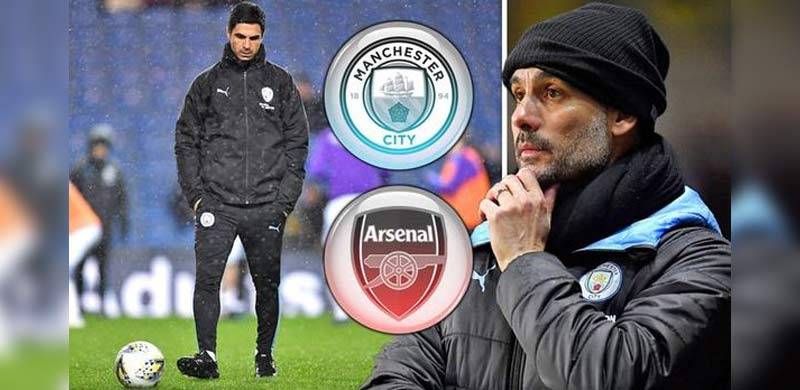
Guardiola will experience a master versus student battle in the coming days - only here he will be in the other corner. Mikel Arteta, current Arsenal manager and former assistant manager under Guardiola at Manchester City, will be facing his boss for the first time on Wednesday. It will be a chance for Arteta to test himself against his master, writes Ismail Farooq.
It might surprise you that Pep Guardiola, the living embodiment of a football ‘philosopher’, was not born with his endless knowledge and intellect regarding the sport. He was initiated into the world of football by the great Johan Cryuff, who was Guardiola’s manager at Barcelona and specifically promoted him from the reserves to the first team. The Catalan would become Cryuff’s midfield lynchpin, acting as the anchor in front of the defence through whom all attacks would flow.
Because of Guardiola’s incredible footballing intelligence and his keenness to consume football in every possible way, Cryuff became his mentor and taught him all he knew about football. Guardiola was ‘brought up’ learning the ways of “Total Football” - a philosophy of playing the game, which was introduced to Cryuff by his own manager and mentor, Rinus Michels.
Although Guardiola would travel the world to amass as much knowledge and expertise as possible before starting his coaching career, his lineage is crystal clear. He is from the house of Cryuff, with the Dutch manager his symbolic father and master.
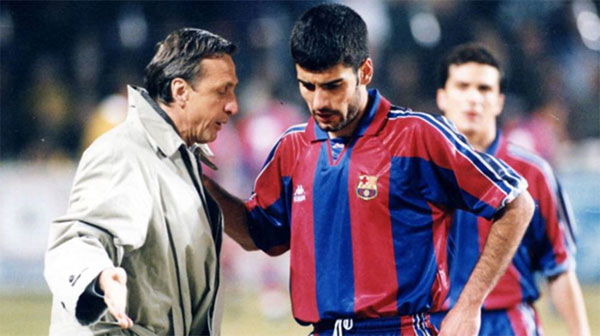
Much to the disappointment of the footballing world, Johan Cryuff practically never managed another club after his time at Barcelona ended in 1996. Not only did the football world not have the active presence of one of the greatest players and icons in football, but we also lost the opportunity to see Cryuff versus Guardiola, master versus student, in all its glory.
Interestingly enough though, Guardiola will experience a master versus student battle in the coming days - only here he will be in the other corner. Mikel Arteta, current Arsenal manager and former assistant manager under Guardiola at Manchester City, will be facing his boss for the first time on Wednesday. It will be a chance for Arteta to test himself against his master.
And Guardiola is very much Arteta’s master. The current Arsenal manager was a part of Barcelona’s famous academy “La Masia” when Guardiola was a first team player at the club. The Catalan was the one player academy youngsters like Arteta were especially told to learn from. Even when Arteta moved away from Barcelona, he and Guardiola kept correspondence. Guardiola respected Arteta’s footballing mind, and the two would discuss tactics and other ongoings in football.
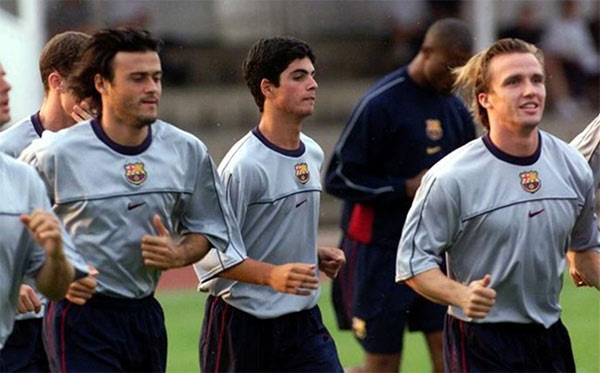
Therefore, few who knew the pair were surprised when Guardiola, then newly appointed as the Manchester City manager, asked Arteta to be his assistant manager. For Arteta, there was only one answer.
Arteta had been a player under Arsene Wenger at Arsenal, and undoubtedly learned massively from him regarding principles of positional play and attacking football. The Frenchman’s knowledge surrounding the game, and his intelligence in general, are hard to transcend.
But from the moment Arteta became assistant manager to Guardiola at Manchester City, it was like a rebirth. He was baptised into the house of Cryuff, of Michels, of Total Football - with Guardiola his Father. If the Christian symbolism has become a bit too much for your liking, I apologise. I am only taking my lead from Guardiola himself, who famously used the words, “Cryuff painted the chapel…” and from this uncanny piece in the Guardian about Guardiola’s time as manager of Barcelona. Anyway, I digress.
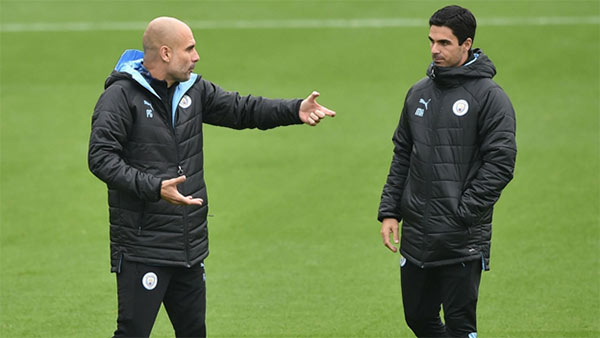
Despite the fact that Arteta has only been the Arsenal manager for little under four months and that he has not had a pre-season with the team, there are still clear signs of his footballing upbringing, lineage and influences.
For starters, Arsenal have become methodical about their build-up play from the back. They are much more organised and composed in playing it out from the defence, with the predictable passing and movements that had become a mainstay of Unai Emery’s last months at Arsenal.
This is related closely to what is, for me, the most important and impressive improvement in Arsenal under Arteta so far. The positional and spatial aspects of their game have developed massively. Each player knows which zone and space to occupy in which phase of play in order to maximise Arsenal’s ability to advance the ball up the pitch and evade the opposition’s high press or unlock their deep block.
It is not much of a surprise if you think about it. Arteta has learned football coaching from the person who is the absolute best in the world at, and the outright expert of, spatial and positional sense on the football pitch. Guardiola has manipulated space and positions in football unlike any manager of the last 20 to 30 years at least, with his sides lining up with, for instance, five attackers, or without anyone playing in the centre-back positions.
Although Arteta plays a 4-2-3-1 formation on paper, it is actually a 3-5-2 in attack. Bukayo Saka plays virtually as a left-winger, with Xhaka moving towards the left to plug that gap. Aubameyang then drifts inside towards the center because of Saka’s movement. Ozil and Pepe more or less mirror the Saka-Aubameyang movement on the right, with Ozil in the right halfspace and Pepe out wide.
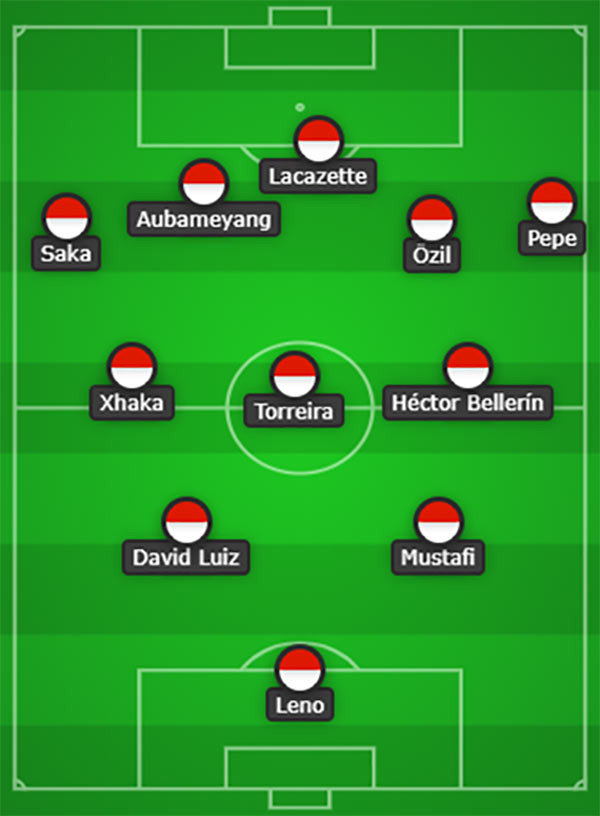
Arsenal’s 3-5-2 formation is similar to the best sides in the world, who all use a variation of attacking with five players in possession. Liverpool use their full-backs high and wide with Salah and Mane coming in-field, while Manchester City maintain their width with their wingers as Kevin de Bruyne and, when he plays, David Silva push up to create a “five” in the attacking third.
Arsenal’s shape puts their players in positions which suit their strengths. For instance, Ozil is a left-footed playmaker who is at his most threatening when operating in the right halfspace, while Pepe is a pacey winger who wants to take on opposition full-backs and cut inside.
Arteta’s 3-5-2 also employs a brilliant and innovative technique that Guardiola came up with at Bayern, which was to tuck his full-back(s) inside when his team had possession. This protected his teams against counter-attacks and allowed them to attack with five players in advanced positions.
But let’s not be mistaken, Arteta has not just taken what Guardiola and him did at Manchester City and pasted it here. He is a man very much in his own element.
Although his principles of play are broadly the same to Guardiola’s - play with the ball, keep the ball as near the opposition goal and as far away from your own goal as possible - but his tactics have been adapted based on the players and resources he has at his disposal.
Arteta’s first priority as Arsenal manager has been defensive solidity. His team is not afraid to sit back and be compact in two banks of four if the other team plays around their press. Their passes allowed per defensive action (PPDA) of 9.66 under Arteta, which is ninth best in the league, shows that they do not always press high.
As a result their defensive numbers have improved considerably. They have conceded nine goals in as many league games under Arteta, with six of those occurring against Chelsea and Everton. For context, Arsenal under Unai Emery this season conceded 19 goals in 13 league games. Therefore, Arsenal are more measured and considered in their approach towards games. Don’t be surprised if Arteta does not take Manchester City on head-to-head like Jurgen Klopp or Gian Piero Gasperini would do.
Arteta has also exercised his authority over the dressing room, and has displayed his command as the manager of the club. He has not been afraid to bench big-hitters and established players if they have been underperforming. Just ask Alexander Lacazette. At the same time, if you are good enough, you are old enough for Arteta, as Gabrielle Martinelli, Bukayo Saka and Eddie Nketiah have discovered so far.
The recent Europa League exit must have hurt Arteta and the players deeply, but sure signs exist that Arsenal are heading in the right direction under the Spaniard. After all, their manager has royalty in his footballing lineage.
It might surprise you that Pep Guardiola, the living embodiment of a football ‘philosopher’, was not born with his endless knowledge and intellect regarding the sport. He was initiated into the world of football by the great Johan Cryuff, who was Guardiola’s manager at Barcelona and specifically promoted him from the reserves to the first team. The Catalan would become Cryuff’s midfield lynchpin, acting as the anchor in front of the defence through whom all attacks would flow.
Because of Guardiola’s incredible footballing intelligence and his keenness to consume football in every possible way, Cryuff became his mentor and taught him all he knew about football. Guardiola was ‘brought up’ learning the ways of “Total Football” - a philosophy of playing the game, which was introduced to Cryuff by his own manager and mentor, Rinus Michels.
Although Guardiola would travel the world to amass as much knowledge and expertise as possible before starting his coaching career, his lineage is crystal clear. He is from the house of Cryuff, with the Dutch manager his symbolic father and master.

Much to the disappointment of the footballing world, Johan Cryuff practically never managed another club after his time at Barcelona ended in 1996. Not only did the football world not have the active presence of one of the greatest players and icons in football, but we also lost the opportunity to see Cryuff versus Guardiola, master versus student, in all its glory.
Also read: Solskjaer And Lampard Might Have A Few Similarities, But Lampard Is Far Better. Here’s Why
Interestingly enough though, Guardiola will experience a master versus student battle in the coming days - only here he will be in the other corner. Mikel Arteta, current Arsenal manager and former assistant manager under Guardiola at Manchester City, will be facing his boss for the first time on Wednesday. It will be a chance for Arteta to test himself against his master.
And Guardiola is very much Arteta’s master. The current Arsenal manager was a part of Barcelona’s famous academy “La Masia” when Guardiola was a first team player at the club. The Catalan was the one player academy youngsters like Arteta were especially told to learn from. Even when Arteta moved away from Barcelona, he and Guardiola kept correspondence. Guardiola respected Arteta’s footballing mind, and the two would discuss tactics and other ongoings in football.

Therefore, few who knew the pair were surprised when Guardiola, then newly appointed as the Manchester City manager, asked Arteta to be his assistant manager. For Arteta, there was only one answer.
Arteta had been a player under Arsene Wenger at Arsenal, and undoubtedly learned massively from him regarding principles of positional play and attacking football. The Frenchman’s knowledge surrounding the game, and his intelligence in general, are hard to transcend.
But from the moment Arteta became assistant manager to Guardiola at Manchester City, it was like a rebirth. He was baptised into the house of Cryuff, of Michels, of Total Football - with Guardiola his Father. If the Christian symbolism has become a bit too much for your liking, I apologise. I am only taking my lead from Guardiola himself, who famously used the words, “Cryuff painted the chapel…” and from this uncanny piece in the Guardian about Guardiola’s time as manager of Barcelona. Anyway, I digress.

Despite the fact that Arteta has only been the Arsenal manager for little under four months and that he has not had a pre-season with the team, there are still clear signs of his footballing upbringing, lineage and influences.
For starters, Arsenal have become methodical about their build-up play from the back. They are much more organised and composed in playing it out from the defence, with the predictable passing and movements that had become a mainstay of Unai Emery’s last months at Arsenal.
This is related closely to what is, for me, the most important and impressive improvement in Arsenal under Arteta so far. The positional and spatial aspects of their game have developed massively. Each player knows which zone and space to occupy in which phase of play in order to maximise Arsenal’s ability to advance the ball up the pitch and evade the opposition’s high press or unlock their deep block.
Also read: Guardiola, Mourinho And Randomness In The System
It is not much of a surprise if you think about it. Arteta has learned football coaching from the person who is the absolute best in the world at, and the outright expert of, spatial and positional sense on the football pitch. Guardiola has manipulated space and positions in football unlike any manager of the last 20 to 30 years at least, with his sides lining up with, for instance, five attackers, or without anyone playing in the centre-back positions.
Although Arteta plays a 4-2-3-1 formation on paper, it is actually a 3-5-2 in attack. Bukayo Saka plays virtually as a left-winger, with Xhaka moving towards the left to plug that gap. Aubameyang then drifts inside towards the center because of Saka’s movement. Ozil and Pepe more or less mirror the Saka-Aubameyang movement on the right, with Ozil in the right halfspace and Pepe out wide.

Arsenal’s 3-5-2 formation is similar to the best sides in the world, who all use a variation of attacking with five players in possession. Liverpool use their full-backs high and wide with Salah and Mane coming in-field, while Manchester City maintain their width with their wingers as Kevin de Bruyne and, when he plays, David Silva push up to create a “five” in the attacking third.
Arsenal’s shape puts their players in positions which suit their strengths. For instance, Ozil is a left-footed playmaker who is at his most threatening when operating in the right halfspace, while Pepe is a pacey winger who wants to take on opposition full-backs and cut inside.
Arteta’s 3-5-2 also employs a brilliant and innovative technique that Guardiola came up with at Bayern, which was to tuck his full-back(s) inside when his team had possession. This protected his teams against counter-attacks and allowed them to attack with five players in advanced positions.
Also read: Anti-Football? Simeone Is More Klopp-Like Than People Think
But let’s not be mistaken, Arteta has not just taken what Guardiola and him did at Manchester City and pasted it here. He is a man very much in his own element.
Although his principles of play are broadly the same to Guardiola’s - play with the ball, keep the ball as near the opposition goal and as far away from your own goal as possible - but his tactics have been adapted based on the players and resources he has at his disposal.
Arteta’s first priority as Arsenal manager has been defensive solidity. His team is not afraid to sit back and be compact in two banks of four if the other team plays around their press. Their passes allowed per defensive action (PPDA) of 9.66 under Arteta, which is ninth best in the league, shows that they do not always press high.
As a result their defensive numbers have improved considerably. They have conceded nine goals in as many league games under Arteta, with six of those occurring against Chelsea and Everton. For context, Arsenal under Unai Emery this season conceded 19 goals in 13 league games. Therefore, Arsenal are more measured and considered in their approach towards games. Don’t be surprised if Arteta does not take Manchester City on head-to-head like Jurgen Klopp or Gian Piero Gasperini would do.
Arteta has also exercised his authority over the dressing room, and has displayed his command as the manager of the club. He has not been afraid to bench big-hitters and established players if they have been underperforming. Just ask Alexander Lacazette. At the same time, if you are good enough, you are old enough for Arteta, as Gabrielle Martinelli, Bukayo Saka and Eddie Nketiah have discovered so far.
The recent Europa League exit must have hurt Arteta and the players deeply, but sure signs exist that Arsenal are heading in the right direction under the Spaniard. After all, their manager has royalty in his footballing lineage.
